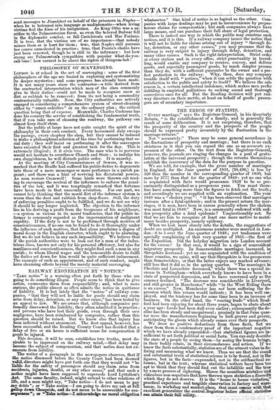RAILWAY EXONERATION BY " NOTICE."
"Mute notice" is a warning often put forth by those who are going to do something illegal. People seem to think that to give notice, exonerates them from responsibility; and, what is more eurious, the public almost as often admits the notice in quittance of liability. It is hut lately that the "notice" of railway com- panies, " that they will not be liable for goods should any claim arise from delay, detention, or any other cause, has been tested by .an appeal to law. We are aware that, although companies pro- fessedly disavowed the liability, they often admitted it m practice ; and persons who have lost their goods, even through their own negligence, have been reimbursed by companies, rather than this question should be raised. But we know also that injury has been inflicted without atonement. The first appeal, however, has been successful, and the Reading County Court has decided that a Zelay of five or six 'hours is sufficient cause for compensation if goods be injured. "Mute notice" is a warning often put forth by those who are going to do something illegal. People seem to think that to give notice, exonerates them from responsibility; and, what is more eurious, the public almost as often admits the notice in quittance of liability. It is hut lately that the "notice" of railway com- panies, " that they will not be liable for goods should any claim arise from delay, detention, or any other cause, has been tested by .an appeal to law. We are aware that, although companies pro- fessedly disavowed the liability, they often admitted it m practice ; and persons who have lost their goods, even through their own negligence, have been reimbursed by companies, rather than this question should be raised. But we know also that injury has been inflicted without atonement. The first appeal, however, has been successful, and the Reading County Court has decided that a Zelay of five or six 'hours is sufficient cause for compensation if goods be injured.
This decision, it will be seen, establishes two truths, most de- sirable to be impressed on the railway mind,—that delay may Become the subject of compensation, and that notice does not ex- -onerate „from The writer of a paragraph in the newspapers observes, that if
tthe notice discussed before the County Court had been deemed valid, directors might have put forth one that they would not "'be liable for the safety of passengers should any claim wise from accidents, injuries, deaths, or any other cause,* and that such a amfic.e might have been supposed to supersede Lord Lytteltori's Act. The same faculty, indeed, might extend to other relations of life, and a man'might say, "Take notice—I do not mean to pay .m debts "; or " Take notice--I am going to drive my cab at full
down Gheapside, and do not mean to be answerable for con- sequences"; or *'Talcs notice--Imiknovalecige no moral obligation whatsoever." One kind of notice is as logical as the other. Com- panies with large dealings may be put to inconvenience by prepos- terous claims for compensation; but such companies always have large means, and can purchase their full share of legal protection. There is indeed one way in which the public may construe such notices, and it is this. If a railway company issues the notice that it will not be liable for claims arising out of injury " through de- lay, detention, or any other causes," you may presume that the railway is very subject to injury through delay, detention, and many other causes. Such is the right interpretation. Strict order at every station and in every office, strict punctuality in travel- ling, would enable any company to receive, convey, and deliver goods, and especially passengers' goods, by much simpler process than they do, with a sufficient guarantee to the owner and a per- fect protection to the railway. Why, then, does any company trouble itself with " notices," when it can settle the question with satisfaction to the public and safety to itself? We believe the sole reason is, a certain intellectual indolence, which makes men prefer dabbling in empirical palliatives to seeking sound and thorough correctives once for all. But the Reading decision will put rail- way directors on their mettle, at least on behalf of goods : passen- gers are of secondary importance.


























 Previous page
Previous page